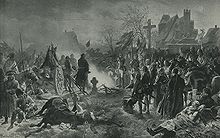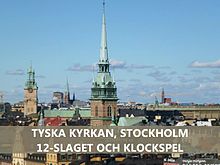Now all thank God

Now thank all God is the title of a chant composed by the Protestant clergyman Martin Rinckart (1586–1649) from Eilenburg . It is one of the most famous sacred songs in German.
Origin and reception

The text Now thanks all God appeared for the first time in 1636 in Rinckart's Jesu Hertz booklet , where it is listed under the heading “Table Prayer”. Some hymnologists also attribute the melody to Rinckart, others to Johann Crüger , in whose hymn book Praxis pietatis melica from 1647 it was first published. At that time, the three stanzas were performed either independently as grace or together with the melody as a "song at table". A connection to the centenary of the Confessio Augustana (1630), which is traditionally often assumed, is not evident from the text itself and is historically questionable.
Towards the end of the 17th century , the song was already a permanent fixture in many important Protestant church hymn books in Germany. It became famous in the 18th century as the "Choral von Leuthen" based on the Battle of Leuthen . On December 5, 1757, near the Lower Silesian town of Leuthen , the Prussian army under Friedrich II defeated the Austrians in the Seven Years' War . On the evening after the battle, 25,000 soldiers are said to have spontaneously intoned the song, which later became a popular national anthem, first in Prussia and later throughout Germany.
Now all thank God plays an unusual and much more ambivalent role in Börries Freiherr von Münchhausen's ballad Der Todplayer from 1903, in which an evangelical pastor tragically, inexplicably, through his particularly inspired chorale play, gradually kills his wife and two of his three Sons in debt.
Now thanks all God received a prominent place in the historical festival of the Dinkelsbühler Kinderzeche created in 1897 as the final chorale of the annual performance since then (except 1940-1947 and 2020). The song has the function of thanksgiving to God for the successful averted plundering of the city by the Swedes in the Thirty Years War. The use of the chorale published in 1634 is anachronistic, however, since the events told in the festival are said to have taken place in 1631.
The chorale was also played in the Friedland camp in 1955 after the arrival of the officially last German prisoners of war from the Soviet Union , whose return was arranged by Chancellor Konrad Adenauer .
The song has undergone numerous musical arrangements, including by Johann Christoph Altnikol , Johann Pachelbel , Georg Philipp Telemann , Johann Sebastian Bach ( BWV 79, 192 , 252, 386, 657 and several fragments), Felix Mendelssohn Bartholdy ( hymn of praise ) , Franz Liszt ( on the inauguration of the Walcker organ in Riga Cathedral , 1884), Max Reger and in the English translation by Catherine Winkworth by John Rutter ( Now thank we all our God , 1974). It is recorded in the Evangelical Hymn book under the number 321 (EG 321). It can be found in the Catholic hymn book Gotteslob under number 405 (GL 405), in the Mennonite hymn book under number 53 (MG 53) and in the New Apostolic hymn book under number 256 (NG 256). Thanks to numerous translations, it is also spread beyond the German-speaking area .
text
Rinckart's poem consists of three stanzas with two Alexandrian pairs each, one female and one male rhyming.
The first two stanzas are the poetic implementation of the apocryphal text Sir 50: 22-24 Lut . The Luther translation is based on:
“ 22 Now all thank God, who does great things everywhere, who keeps us alive from the womb and does all good things for us. 23 May he give us a joyful heart and grant us peace in our time in Israel 24 and that his grace may stay with us and save us as long as we live. "
The third stanza is a adaptation of the Gloria Patri .
| Original text | Today's text version |
|---|---|
|
Now all thank God |
Now all thank God |
The original version of Rinckart was sung with minor deviations into the 20th century and was found in the Protestant church hymnbook used until 1993/96 . In the current version, the "jetzund" in verses 1 and 3 has been deleted; “He who is like the two” has been replaced by “God the Holy Spirit”. The “er” in the third to last line was replaced by “es” in the 19th century and thus adapted to the Luther translation of the Gloria Patri ; The "three times one" was smoothed out as early as the 18th century and also in DEG in 1915.
Translations
A Danish translation "Nu takker alle Gud med hjerte, mund og hænder ..." from 1717 appeared, edited several times until 1890, in the Danish hymn book Den Danske Salmebog , Copenhagen 1953, No. 11, in Den Danske Salme Bog , Copenhagen 1993 , No. 11, and was taken over again in the following, current edition Den Danske Salmebog , Copenhagen 2002, No. 11 (with the same number, thus belonging to the "basic stock"). Notes on this in J. Kærsgaard, Salmehåndbog , Volume 2, Copenhagen 2003, to No. 11, on earlier arrangements and translations by BC Ægidius, in the Danish hymn book Flensburg 1717, in the hymn book Pontoppidan 1740 etc. The song is also in the Danish military songbook, Forsvarets sangbog , 5th edition, Copenhagen 1972, No. 9 (based on the hymn book Pontoppidan 1740). It is noteworthy that the Danish translation was so perceived as "Danish" that even in 1920, when Sønderjylland was reunified with Denmark after the First World War, this song was sung in the church on the day that German rule, which had been perceived as very threatening since 1864, was ended (cf. report by a contemporary witness, written before 1979, in: Nyhedsbrev. Genforenings- og Grænsemuseet , January 2020, p. 7).
literature
- Adolf Brüssau: Martin Rinckart (1586–1649) and his song “Nun danket alle Gott”. Schloeßmann, Leipzig 1936.
- Wilhelm Büchting, Siegmar Keil: Martin Rinckart. Life and work. Pietsch-Verlag, Spröda 1996, ISBN 3-00-000740-7 .
- Siegmar Keil: Martin Rinckart's song “Nun Danket alle Gott” in the Spiegel early prints. In: Eilenburger Jahrbuch 1999, pp. 82–92.
- Siegmar Keil: "Now everyone thank God". A hymn as a source of inspiration. In: Die Tonkunst online. The online magazine for classical music , issue 0510 from October 1st, 2005.
- Siegmar Keil: Martin Rinckart's “Now thank all God” in different text and melody versions. In: Forum Kirchenmusik 2007 / I, pp. 4–13.
- Siegmar Keil: The “Choral von Leuthen” - a Prussian-German myth. In: Die Tonkunst 4/2007, pp. 442–449.
- Andreas Marti : 321 - Now everyone thank God . In: Wolfgang Herbst , Ilsabe Seibt (Hrsg.): Liederkunde zum Evangelischen Gesangbuch . No. 16 . Vandenhoeck & Ruprecht, Göttingen 2011, ISBN 978-3-525-50302-7 , pp. 35–43 ( limited preview in Google Book Search).
Web links
- Michael Fischer: Now everyone thanks God (2007). In: Popular and Traditional Songs. Historical-critical song lexicon of the German Folk Song Archive
Individual evidence
- ^ Martin Rinckart: Jesu Hertz booklet. Leipzig 1636.
- ↑ Wolfgang Herbst (Ed.): Who is who in the hymnal? , Vandenhoeck & Ruprecht, Göttingen 2001, ISBN 3-525-50323-7 , pp. 255 f. ( limited preview in Google Book search)
- ↑ so Siegmar Keil ( Memento of the original from April 2, 2015 in the Internet Archive ) Info: The archive link was inserted automatically and has not yet been checked. Please check the original and archive link according to the instructions and then remove this notice. (2005).
- ↑ so Michael Fischer (2007).
- ^ Digitized in Deutsche Balladen , Bielefeld / Leipzig 4/1933
- ↑ See website www.kinderzeche.de
- ^ Baltic States , 1st edition 2005, Verlag Karl Baedeker , page 300
- ^ John Rutter / Now thank we all our God / No. 1 of Two Hymns of Praise . Oxford University Press . 1974. Retrieved January 5, 2018.
- ↑ NVn dancket all God (Martin Rinckart 1636) ; In: Eckhard John (ed.): Popular and traditional songs. Historical-critical song lexicon of the German Folk Song Archive; Text version based on Martin Rinckart: JESV-Hertz-Büchlein in it all Bernhardinische and Christ Lutherische Jubel-Hertz-Frewden collected . Leipzig 1636.
- ↑ According to EG 321; The AöL and GL versions have "in our life" in stanza 2 and "the Triune God" in stanza 3.
- ↑ On the word form cf. Grimm's Dictionary .
- ↑ So in DECG in 1854 and also in the ECG the 1950s.
- ↑ See Bach Cantata 192
- ^ Song dictionary
- ↑ Cf. Otto Holzapfel : Lied index: The older German-language popular song tradition ( online version on the Volksmusikarchiv homepage of the Upper Bavaria district ; in PDF format; ongoing updates) with further information.
